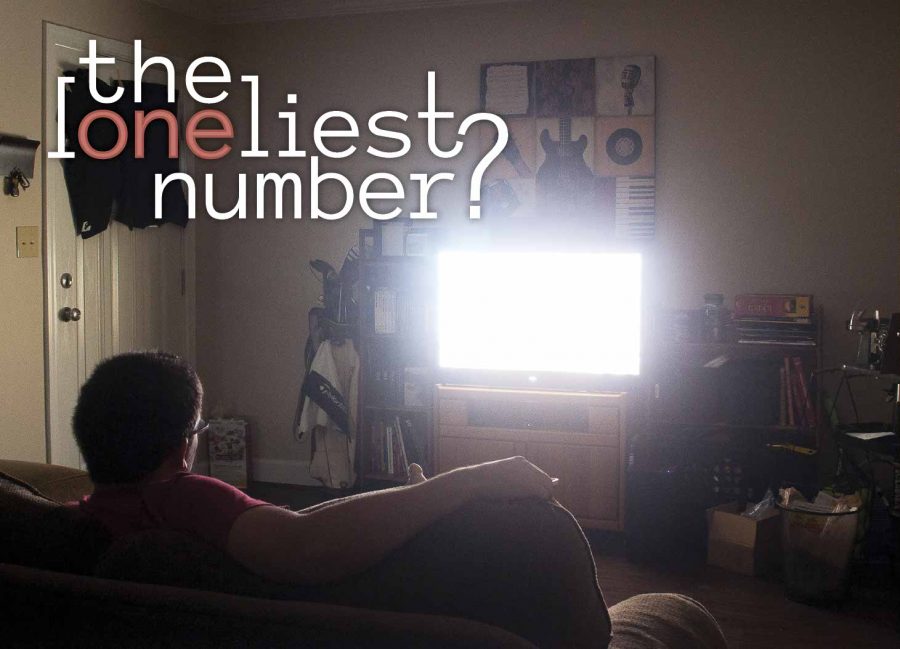Zyda Culpepper-Baldwin lives in a building with 965 other girls, but every night she comes home to a space of her own. More than content with her arrangements, Culpepper-Baldwin is part of a growing number of college students who live alone.
While most people would think a single room could get lonely or boring, Culpepper-Baldwin, a sophomore majoring in vocal performance, said she sees it as a sanctuary.
“It’s just nice, sometimes you just need that space besides just one room where you can be alone,” she said. “I prefer it. Sometimes not everyone wants to deal with people. I think it’s nice to just have that one place that you can just be by yourself, do what you want, have a completely open space that’s just to your comfort level.”
Her situation is very uncommon. Alicia Browne, director of Housing Administration, said of the 7,800 bed spaces on campus, there are only 60 one-bedroom suites between the Lakeside and Riverside communities and 10 to 15 single rooms scattered throughout the other residence halls, such as Tutwiler, where Culpepper-Baldwin is a resident advisor.
(See also “Students learn, grow together in living learning communites“)
“Most students have at least suitemates, if not roommates,” Browne said. “Some of those singles are large enough to be doubles. Use depends on need, so if a person with a medical need is one of those rooms, and needs it to be a single, it is.”
Culpepper-Baldwin lived in a suite with three other girls in Presidential Village last year and said she frequently incurred conflicts with her roommates about partying and cleaning.
She said she prefers Tutwiler because she felt more alone in a suite-style dorm than she does in a community-style dorm.
“I have a lot more friends in Tutwiler than I did living in Presidential,” she said. “When I’m walking to my room, you can’t avoid people, so I can’t help but say hello to them. It’s easier building relationships like that because you guys are so close together, versus a suite style where everyone is just basically closed off. It’s hard to get to know people and get past that living room door.”
Jeff Parker, a professor of psychology specializing in child and adolescent development, said that living alone in college is a less isolating experience than living alone as an adult.
“I think the most important thing is to realize that college students are in an unusual place,” he said. “None of what we understand about loneliness or being alone or any of the stuff that you might think applies to college students, because they don’t live in a very realistic world. Being alone in this context is not really being alone.”
Jeff Parker said some students choose to live alone because they want a retreat from their busy social lives.
“That’s a very different kind of situation than you have where someone actively isolates themselves from the social world,” he said. “I don’t really think there are any profound social consequences for it honestly, with everything I know. It’s just not a big deal.”
Jeff Parker said there are advantages to having a roommate, such as lower cost of housing, companionship and an increased tolerance of others.
“It’s a great way to learn about all of that accommodation, and by not having a roommate it’s possible that you’re not really learning how to accommodate a group, learn something about diverse conventions,” he said. “It’s probably, in that respect, good training ground for the work place and other kinds of environments where you have to get along with people.”
While most people don’t become best friends with their roommates freshman year, Jeff Parker said living with another person does have social benefits beyond the immediate roommate relationship.
“Like anyone else, roommates form peripheral friends of friends, and that’s an important point of contact for a whole range of things,” he said. “For example we know, it’s usually from that network that your romantic relationships are drawn. So if you don’t have a roommate, you’re missing out on a kind of resource for what we call ‘social reach,’ how far you can reach into the world.”
Jeff Parker said roommate conflicts are often the major source of stress for college students.
(See also “Dorms part of freshman experience“)
“The downside of having a roommate, and a lot of the reasons why people don’t get along, is that the roommate has no commitment to them,” he said. “A friend has commitment, they don’t want to lose you as their friend, and they realize sometimes they’re going to have to compromise and make choices that aren’t in their own best interests because they are trying to get along with a friend. But a roommate doesn’t have to have that. A roommate, unless they’re a friend, just wants everything to go smoothly.”
“I could take any one of my students from my lab or my classes and put them in an apartment by themselves,” Jeff Parker said. “Although they would miss the camaraderie, they would make up for it.”
And apartment complexes are more than willing to oblige with students’ growing interest in living alone. Increasing numbers of off-campus housing developments are offering single-living options. Jenn Arcidiacono, a Leasing Agent for Spaces Management, said she has seen increased demand for single rooms over the past few years. Midtown Village Condominiums, which she leases, has sold out of one-bedroom units for the next year. Only two Spaces Management properties have a handful of one-bedroom units available for next year.
“They sold really, really fast,” Arcidiacono said. “Probably more so recently. I think parents are more and more okay with their kids, especially their daughters, living alone, as long as we keep our security features up to date, which we do.”
For students who opt to live alone but still remain on campus, isolation from neighbors is the trade-off for the all-inclusive suite-style mega dorms. Rachel Parker, a freshman majoring in psychology, lives alone in Lakeside East, and said, while she can hear her neighbors at all hours of the night, she doesn’t see them often.
“I call them the rowdy neighbors and I don’t talk to anyone on my floor. I just keep to myself as far as that goes. Obviously it’s lonely and it gets kind of creepy at night,” Rachel Parker said. “People are making weird noises and stuff out in the hallways.”
Rachel Parker said she enjoys her single suite and doesn’t feel like her social life is negatively affected by living by herself.
“I thought I was just going to be lonely and sad, but no, it’s actually really peaceful because I’m kind of an introvert,” Rachel Parker said. “So it’s easier for me to unwind that way. It’s actually really convenient and it just takes away the idea of conflict with anything. You don’t have to worry about the other person waking you up at all hours or anything like that.”
Culpepper-Baldwin said, while she maintains an active social life outside her dorm, living without a roommate can get lonely for her too at times.
“I think that’s the one downside, not having someone to watch movies with,” she said. “Someone to just vent to, when you come home and you’re like, ‘Oh my god, you won’t believe how my day just went.’ So I usually just call a friend. I would, of course, consider the idea of living with someone else but living alone isn’t so bad that I’m looking forward to having a roommate in the future.”
While she plans to live alone as an RA in Tutwiler again next year, Culpepper-Baldwin said she doesn’t rule out the possibility of having a roommate again one day, perhaps just not in the conventional sense of the word.
“I would love to have an apartment by myself,” she said. “The only companion I think about having is a puppy.”
(See also “Suite-style dorms attractive but illogical, lonely“)









